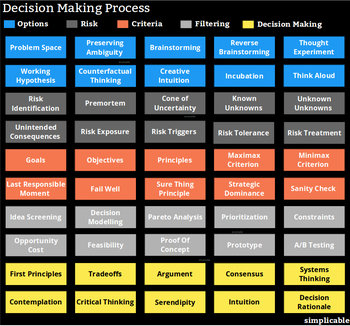|
| |
The sure thing principle is a decision making guideline that suggests there is no need to consider uncertainty in a decision that wouldn't impact the decision anyway. This is used to counter the common tendency to worry about uncertainties that are practically irrelevant to a particular choice. It is common to avoid choices that involve uncertainty or spend a great deal of effort considering probabilities. The sure thing principle is a basic sanity check that potentially simplifies decisions by dropping unnecessary considerations.ExampleAn investor is considering buying a stock but she is worried about an upcoming election. There are two candidates running A and B. If A wins she will be happy and will buy the stock. If B wins she will be disappointed but would still like to own the stock. In such a scenario, the uncertainty of the election is obscuring the fact that the investor would like to purchase the stock, either way the election turns out.|
Type | | Definition | The principle that uncertainties can be eliminated from decision making consideration if they would not impact the decision one way or another anyway. | Related Concepts | |
Decision Making
This is the complete list of articles we have written about decision making.
If you enjoyed this page, please consider bookmarking Simplicable.
© 2010-2023 Simplicable. All Rights Reserved. Reproduction of materials found on this site, in any form, without explicit permission is prohibited.
View credits & copyrights or citation information for this page.
|































